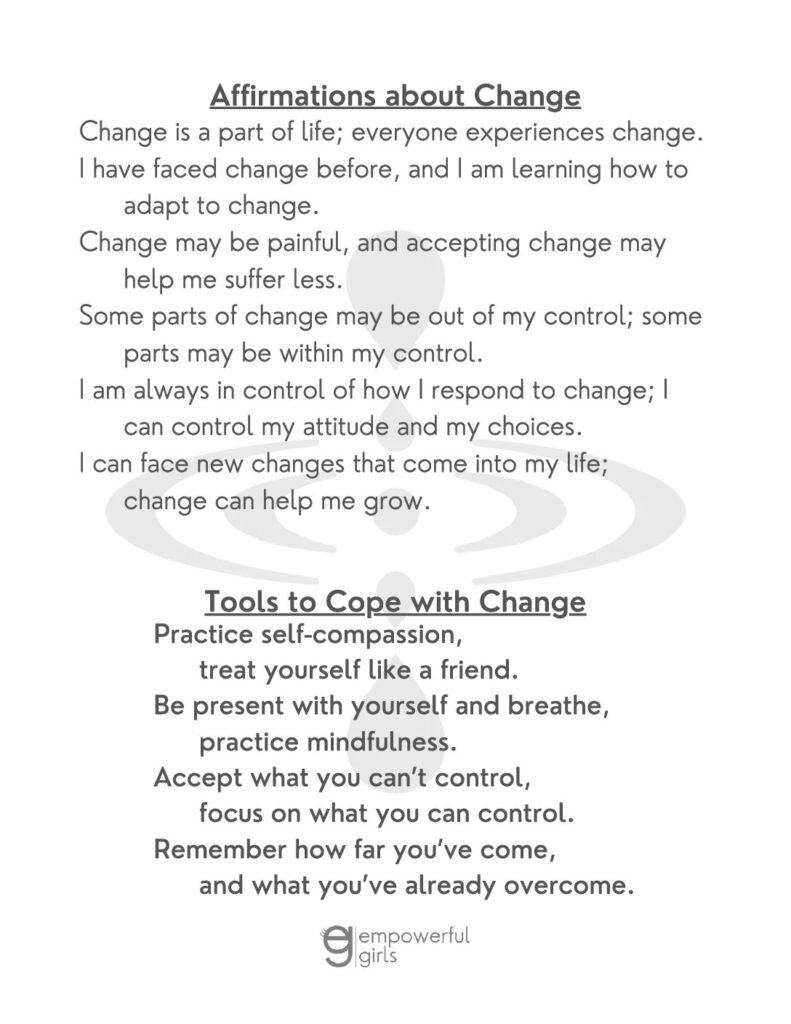
Change All Around
I honestly love when you reach out and ask me to cover a topic you need guidance with, and a fellow Empowerful Girl named Breya did just that! She said she’s been dealing with a lot of change and moving lately. Breya, I hear you. And I imagine a lot of you girls do, too. School just started here in Las Vegas, which brings a lot of change. And you may be facing other changes in your life: with your friends, your family, your home, your activities, your routine, your responsibilities, and even physical or emotional changes in yourself.
Count on Change
Change has been shaking up people’s lives for-ever! Over 2,500 years ago, the Greek philosopher Heraclitus said, “Change is the only constant in life.”
Now think about what life was like for the girls your age that were growing up in his village around the year 500 B.C. Even though their day-to-day life would seem quite simple to us, I’m sure those girls felt like they were dealing with a lot of change in their lives then. And they didn’t have the ‘fast-paced, digital, on-demand, continuously evolving information and events’ kind of life that you do. Hands down, you girls are faced with more changes — that in-turn bring more stressors, more pressures, more expectations, more options, more obstacles — more changes than any other generation before you.
How to Cope with Change
Sometimes change feels stressful, uncomfortable, difficult, and makes you worry about what’s going to happen. You may also feel frustrated that you’re having trouble adapting to change, like, “Why is this so hard for me?” or “I should be able to handle this.” You might even feel like you have to stuff down your feelings and force a smile through it, hiding how the change is affecting you. Those aren’t your only options, though.
So first tool: treat yourself with the same kindness and understanding that you would show to a friend if they were going through a rough time. That’s called self-compassion. Give yourself credit for dealing with what you’re faced with, all the change surrounding you. Instead of criticizing or judging yourself for how you respond or react to what’s happening in your life, recognize it. Tell yourself, like you would tell your friend,
“Change is hard, so it makes sense I’m having a hard time with change.”
“This isn’t something I’ve dealt with before, so naturally I feel worried about what will happen.”
“I did not see that coming, so of course I feel unprepared to handle it.”
“It’s okay that I’m not okay with this change right now.”
Just saying something like that to yourself is a way to show yourself compassion.
Next tool, take a moment and be present with yourself. Breathe intentionally, with purpose. Do a breathing exercise like we discussed in ep. 005, like box breaths: in for a count of four, hold for four, out for four, hold for four. Breathing helps your brain calm down, which helps your body calm down. Listen to ep. 005 for more on breathing techniques.
You could also practice mindfulness, where you pause for a few minutes to just notice what your senses experience inside you and around you. However it works for where you are, stand, sit, or lay down, close your eyes if you want, and note without judgement what you sense. Meaning, if you hear your neighbor’s dog barking, instead of feeling annoyed, note ‘barking.’ Like, notice the feeling of the ground beneath you: ‘hard,’ ‘softness,’ ‘cool grass.’ Notice your lungs fill and release air as you breathe: ‘in, out.’ Sense heat in your face, your heartbeat, any tension in your neck or shoulders, and note them: ‘warmth,’ ‘beating,’ ‘tension.’ Note any sounds you hear: ‘traffic,’ ‘leaves rustling,’ ‘kids.’ This is a form of meditation, which can help you center yourself so your head stops spinning ,so you can then address the change.
With any change there will be things you can and can’t control. Accepting what you can’t control is difficult. Dr. Kristen Neff taught in her book, “Self-Compassion,” that suffering = pain x resistance. So the more you resist what’s going on by telling yourself, “That shouldn’t have happened,” “It wasn’t supposed to be this way,” or, “Why me?” the more you will suffer. She quotes the Dalai Lama,
“Pain is inevitable, but suffering is optional.” Dalai Lama
So when faced with change, you need to access your tools for control. Like we discussed in ep. 002, say what’s going on with this change, name your feelings and emotions you have because of it (it’s ok to not be okay), figure out what you can control (maybe there is something you can do about it) and also accept what you can’t control, so you won’t suffer as much with the change. You could even write some affirmations about change and control, and repeat them when you need a helpful reminder. Here are some I created:
Change is a part of life; everyone experiences change.
I have faced change before, and I am learning how to adapt to change.
Change may be painful, and accepting change may help me suffer less.
Some parts of change may be out of my control; some parts may be within my control.
I am always in control of how I respond to change; I can control my attitude and my choices.
I can face new changes that come into my life; change can help me grow.
I’ll also recommend listening to ep. 015 for more ideas on how to manage stress.
Sometimes when we’re in the thick of something difficult, we are so focused on the obstacle in front of us that we forget all of the hurdles we’ve cleared before. Oprah Winfrey shared,
“When you surrender and stop resisting and stop trying to change that which you can’t change … and look at where you are and how far you’ve come and what you’ve accomplished — when you can claim that and see that, the literal vibration of your life will change.”
I’m going to call this tool “Remember how far you’ve come,” or “Remember what you’ve already overcome.” You may not have faced this change before, but you’ve made it past many other changes. You’ll get through this one, too.
“Change is the only constant in life.” But change doesn’t have to take over your life.
Practice self-compassion.
Be present with yourself and breathe.
Practice mindfulness.
Accept what you can’t control. Focus on what you can control.
Remember how far you’ve come and what you’ve already overcome.
Cope with Change Poster Printable
To help you with this, I created a “Cope with Change” poster for you to print out, personalize, and post on your wall where you’ll see it, remember it, practice it, and believe it — that’s the important part.
Resources
Here are several of my favorite books that illustrate this:
Who Moved My Cheese for Kids by Dr. Spencer Johnson
Perfect Square by Michael Hall
Wherever You Go by Pat Zietlow Miller
And if you’re looking for a book that’s more specific to the change you’re facing, I encourage you to check your local library — there are loads of books out there to help you with that change.
If you have a topic suggestion, I’d love to hear from you! Send an email (tweens get the OK from your parents) to hello@EmpowerfulGirls.com .
If you have social media already, follow me on Insta or tiktok @empowerfulgirls. I’m not encouraging or endorsing social media, but I’m on there to offer an unfiltered, uplifting alternative to what’s in your feed. Remember to get on the email list for the newsletter!
Also, if you enjoy listening to 10 for Teens + Tweens, I would truly appreciate you telling your friends about this podcast or leaving a review so others can find it and feel uplifted, too! Your support means the world to me!
